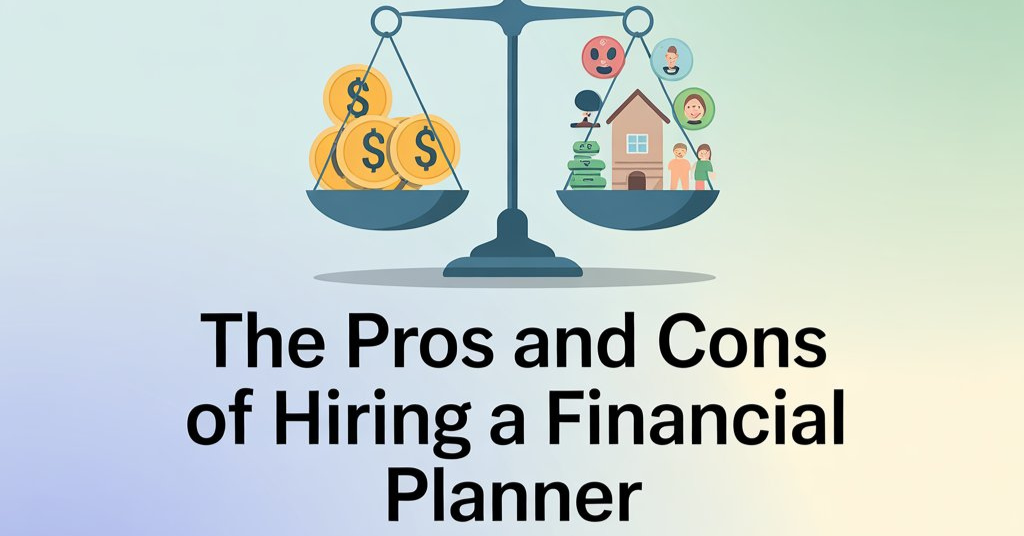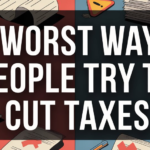Managing money sounds simple in theory—save, invest, grow—but the reality is often more complex. Between superannuation, tax planning, mortgages, insurance, retirement goals and rising living costs, many Australians consider hiring a financial planner for help.
But is it always worth paying someone to manage your finances? In this detailed blog, we’ll break down the pros and cons of hiring a financial planner, using Australian-relevant examples, real numbers, and simple explanations to help you decide what’s right for you.
✅ What Does a Financial Planner Actually Do?
While every planner is different, most offer help in areas like:
- Retirement planning (especially superannuation strategies)
- Investing and wealth building
- Budgeting and cashflow management
- Tax-efficient strategies
- Insurance advice
- Estate and family planning
- Goal-based financial planning (e.g. home deposit, children’s education, early retirement)
Some are commission-based, some charge a flat or percentage fee, and others work on hourly advice. Many Australians choose planners when life gets more complex — marriage, kids, buying property or nearing retirement.
✅ The Pros and Cons of Hiring a Financial Planner
The Pros of Hiring a Financial Planner
1. Expert Knowledge You Might Not Have
A good financial planner brings experience that the average person doesn’t have.
For example:
- Understanding how to boost superannuation tax-effectively
- Knowing which investment strategies suit your age and income
- Explaining how market downturns affect long-term goals
Many Australians admit they “don’t know where to start” when investing or planning for retirement. Expertise can save time and reduce guesswork.
2. Personalised Financial Strategy
Unlike general advice you hear online or from friends, planners can assess your real situation.
They may create a custom plan based on:
- Your age
- Income level
- Family structure
- Home ownership
- Debt
- Super balance
- Risk tolerance
- Lifestyle goals
Example:
A 35-year-old with a $120k salary, two kids and a $600,000 mortgage will need different strategies than a 50-year-old with $1 million in investments and no home loan. A financial planner can tailor those plans accordingly.
3. Helps You Stay on Track (Especially During Market Crashes)
Money decisions are emotional. People panic during downturns or overspend in good times. A planner offers accountability and reassurance.
During the COVID-19 dip, many investors lost more by selling in panic. A planner could help you stay calm and stick to your strategy.
4. Saves Time and Effort
If you don’t enjoy researching investment options, monitoring markets, comparing insurance or tracking superannuation, delegating it can be a huge mental relief.
Instead of spending hours reading finance forums or second-guessing every move, a planner handles the heavy lifting.
5. Access to Professional Tools and Strategies
Many planners use professional tools:
- Portfolio management platforms
- Cashflow forecasting software
- Retirement projection models
- Tax strategy reporting
They may also connect you to:
- Mortgage brokers
- Tax specialists
- Insurance advisors
This can simplify financial decisions without you juggling multiple services.
6. Preparing for Unexpected Life Changes
Life doesn’t always go to plan—job loss, illness, divorce, death, or changing goals can disrupt finances. Good planners create flexible strategies designed to adapt.
They can review your plan regularly and adjust contributions, investments or insurances when needed.
7. Education and Long-Term Confidence
Over time, a planner can help you understand:
- How investing actually works
- How compound growth builds wealth
- Which super choices matter
- How to plan retirement income
This learning builds financial confidence—even if you eventually manage things yourself.
The Cons of Hiring a Financial Planner
While the benefits are strong, there are also drawbacks to consider.
1. Cost Can Be High (and Eats Into Returns)
Fees vary, but many Australian planners charge:
- 1% to 1.5% of your invested assets annually
- $2,000–$5,000 for an initial plan
- $200–$400 per hour for advice
🔹 Example: Cost Over Time
Say you invest $300,000 and your planner charges 1% per year.
That’s:
- $3,000 per year in fees
If the investments grow at 7% annually over 20 years:
✅ Without planner fees:
$300k × (1.07)²⁰ ≈ $1,161,471
❌ With 1% fee → Net growth 6%
$300k × (1.06)²⁰ ≈ $962,141
Difference: $199,330 lost to fees.
So the planner’s value must outweigh that cost.
2. Conflict of Interest Risks
Some advisers push products that pay them commissions—like insurance, managed funds or complex investment schemes. Even if legal, the suggestion might not be the cheapest or best for you.
That’s why many Australians prefer “fee-for-service” instead of commission-based planners.
3. Quality Varies
Not all financial planners are equal. Some:
- Have limited experience
- Offer cookie-cutter plans
- Avoid ongoing support
- Don’t explain things clearly
- Push products over planning
Unless you vet them well, you might pay high fees for low value.
4. You Might Lose Some Control
For people who like DIY investing, giving control to someone else can feel uncomfortable. You rely on their judgement and risk tolerating decisions you wouldn’t personally make.
Some planners also use platforms where you don’t get daily visibility or flexibility.
5. Not Always Necessary for Simple Finances
If you:
- Have no major debt
- Understand basic investing
- Use low-fee index funds
- Manage your super well
- Have clear goals
…then paying thousands in fees might not make sense.
Many Aussies use robo-advice, online brokers, or self-paced tools successfully.
6. Risk of Over-Dependence
Some people rely entirely on their planner and never learn anything themselves. If the relationship ends or you change advisers, you may feel lost.
Financial knowledge is still important—even if someone else manages the details.
✅ Should You Hire a Financial Planner? Key Questions
Before deciding, ask yourself:
✔ 1. How complex are your finances?
Are you juggling:
- Investments
- Super consolidation
- Tax planning
- Family planning
- Business income
- Property loans?
If yes, the guidance could be valuable. If all you manage is salary and savings, maybe not.
✔ 2. Do you understand investment basics?
If terms like:
- Asset allocation
- ETFs
- Salary sacrifice
- Compounding
- Capital gains tax
confuse you, a planner could help.
✔ 3. What’s your tolerance for mistakes?
One wrong decision—like cashing out super, choosing bad insurance or investing emotionally—could cost far more than a planner’s fee.
✔ 4. Can you afford the fees?
Planners often offer:
- Flat-fee plans
- Hourly consults
- Annual review plans
- Asset-based fees
Make sure cost doesn’t outweigh potential benefit.
✔ 5. Do you have the time and discipline?
If financial planning stresses you out or gets pushed aside, outsourcing may protect your long-term goals.
✅ Real-Life Australian Example (with Numbers)
Case: Emma, 42, Melbourne
- Salary: $115,000
- Super balance: $210,000
- Mortgage: $450,000
- Wants to retire at 60
- Unsure about investing beyond super
She meets a financial planner who charges:
- $2,200 initial advice
- $2,500 per year ongoing
Planner’s suggested strategies:
- Salary sacrifice $10,000/year to super (taxed at 15% instead of 32.5%)
- Consolidate three old super accounts to reduce duplicate fees
- Start an investment portfolio of $500/month
- Review insurance covers
Tax savings example:
Without planner:
- Emma pays ~32.5% on $10k = $3,250 tax
With salary sacrifice:
- Only 15% tax = $1,500 tax
Savings: $1,750/year
Even after planner fees, Emma benefits through:
- Tax efficiency
- Strategy planning
- Less confusion
- Reduced super fees
- Clear retirement roadmap
For someone like her, the value may exceed the cost.
Also Read: Situations That Suggest Its Time to Hire a Financial Advisor
✅ Tips for Choosing the Right Planner (Australia-Friendly Advice)
✔ Ask about fee structure
- Flat fee?
- Percentage?
- Hourly?
- Commissions?
✔ Look for transparent, easy communication
If they can’t explain in simple terms, that’s a red flag.
✔ Know if they’re product-focused or planning-focused
✔ Ask how ongoing reviews work
Do you get:
- Annual meetings?
- Strategy updates?
- Portfolio reviews?
- Progress reports?
✔ Make sure they align with your goals
Someone who understands your priorities—retirement, family, lifestyle—will give better advice.
✅ When a Financial Planner Makes Sense
Hiring one can be worthwhile if you:
✅ Have growing investments
✅ Want retirement clarity
✅ Don’t have time to manage everything
✅ Feel stressed making financial decisions
✅ Want tax-smart strategies
✅ Need help with super strategies
✅ Lack confidence in investing
✅ When You Might Skip It
You might not need one if you:
❌ Have simple finances
❌ Understand the basics well
❌ Enjoy DIY money management
❌ Have small savings or low investment balances
❌ Can follow automated or low-fee advice options
✅ Final Verdict: Is Hiring a Financial Planner Worth It?
There isn’t a one-size-fits-all answer. What matters is whether the value outweighs the cost.
Hiring a planner can be a smart move if:
- You want confidence, structure and guidance
- Your financial life is becoming complex
- You’re aiming for long-term wealth and need a roadmap
- You want to avoid big money mistakes
It may not be necessary if:
- You’re financially savvy
- Your finances are basic
- You’re comfortable managing investments yourself
- Paying fees would eat too much into your returns










